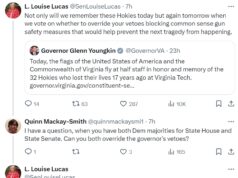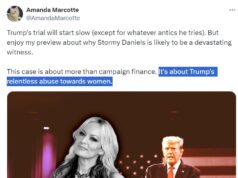In a comment on my piece, “Trump Voters: Should We Write Them Off or Try to Bring Them Back from the Dark Side,” Lowell posed what he described as “a philosophical question”:
Can you be a “good person,” as Andy claims the Trump supporters in his district are, and support what I think we all consider to be a dark force and/or evil incarnate? I’d strongly argue that you can’t be. Andy argues that you can be. Thoughts?
Here are my thoughts.
First, let us translate the question into a tangible, empirical form.
Imagine that you get to know a couple who, as far as you can tell, have a loving family. They also are people who deal honorably with people in their business. When someone they know is sick, or in some other such crisis, they’re likely to bring the family food. They’re people who will stop to help someone stranded by their car breaking down. Perhaps they’re even the kind of people who, when something like the Katrina disaster strikes, go out and buy — out of their own pocket — some materials that will be helpful to the afflicted, and drive all the way down to Louisiana to help out.
At the same time, they also reliably vote for this ugly and dishonest Republican Party, and whether or not they started out liking Trump (and they might have), they certainly ended up voting for him. They are loyal to the most destructive political force to arise in America in a century and a half.
That’s the kind of reality that I and other liberals out here in the Shenandoah Valley witness.
Going back to our question: “Can one describe these people, as I have done, as ‘good’ and ‘decent’?” Or perhaps the question could usefully be reframed as, “How is this inconsistency — this goodness in various spheres of life, this alignment with evil in the political sphere — to be understood?”
There’s a concept that I think provides the key to the answer: the idea of “part selves,” or of “independently functioning modules” of the self.
The notion that people are not just one unitary self is not original to me: it has been developed by some psychologists (see some readings, listed below) who see us having “multiple selves” or a “multimind.” The idea is that as we move through our daily lives, we can unconsciously switch from one way of thinking and feeling to another.
It might well be true of most of us that we are “good” people in some ways (when we’re employing modules or selves aligned with the good, with wholeness) and less than good (or even aligned with evil, with the force of brokenness) in others ways, when a different one of our “selves” gets employed.
The “self” a person brings to the political realm can be a special case. That’s because politics is about power, and power is frequently involved in introducing brokenness into the human system. In my book WHAT WE’RE UP AGAINST, I employ the concept of “part selves” specifically to illuminate the sickness in the politics of our times.
What I proposed there dealt specifically with the nature and workings of power in the Old South. It delineated how power influenced the dynamics of community in the South, and how individuals in those communities were socialized to have a particular kind of conformist module to be used regarding a particular category of issues: namely, those issues concerning which demands are made by the power with which the person’s community is aligned. (See pages 146-154.)
The culture trained people to employ a module in which their critical intelligence gets shut off, and in which people disconnect from their usual moral moorings. Employing this module keeps the individual in alignment with their community– a community which in turn was shaped for that purpose by the ruling power.
This mention of the Old South affords another way of looking at the implications of saying that no one who supports an evil power can be considered a good and decent person. In the South even well into living memory, the social order was one of racial terror and oppression. Jim Crow and segregation were clearly evil by any reasonable measure, and mighty few were the whites in the region who refused to support it.
Would we want to conclude that in the Old South — of the days of slavery, and all the way up into and past the 1950s — there were virtually no “good” or “decent” white people? Is there anyone here who would want to say that?
The contemporary version of that same culture provides a major portion of the base for today’s Republican Party. And without an almost clean sweep of the states of the Old Confederacy, Donald Trump would not be our next president.
So those patterns formed by power and community and the instilling of a particular kind of “self” that is switched on to engage with the political sphere remain relevant today.
What I’ve read thus far about the psychology of “multiple selves” seems to argue that this kind of division of the psyche is a natural human phenomenon, the way people are by nature. Perhaps in some ways it is.
But I think that an essential dimension of this division into discrete “modules” is a function of “brokenness.” The impact of brokenness on the person, plus the inability of the person to reconcile the resulting different aspects of the self (and/or to process the impact of trauma), leads to a lack of psychic integration. (Perhaps such division into different “selves” might even be understood as on a continuum on which “multiple personality” disorder is further out on the spectrum– a difference of degree that breaks down into a difference of kind.)
So, if my perspective is valid, calling these people “good, decent conservatives” is only part of the truth. It is an important part of the truth because part of them really is aligned with wholeness– hence their being honorable, generous, responsible, etc. in many domains of their lives. But it is only part of the truth because along with the wholeness, they have been impacted by a force of brokenness, and they themselves are not all of a piece.
So the answer I would give as to whether such people are “good, decent people” is yes and no.
But then, of whom can that not be said?
Postscript: My effort in the pieces I write for the newspapers is to illuminate their political allegiance in the light of their wholeness, i.e. the good values many of the region’s conservatives live by in their non-political lives. In other words, I’m trying to erode the discreteness of these psychic modules.
***********************
Readings on such multiplicity of selves:
Internal Family Systems Therapy, by Richard C. Schwartz.
The Social Brain, by Michael Gazzaniga.
Multimind: A New Way of Looking at Human Behavior, by Robert Ornstein.


 Sign up for the Blue Virginia weekly newsletter
Sign up for the Blue Virginia weekly newsletter
![Tuesday News: “Johnson gambles on plan separating Israel aid from Ukraine funds”; “It Took One Day for Trump to Get in Trouble at His First Criminal Trial”; “If [Youngkin] wanted to write bills, he should have run to serve in the General Assembly”](https://bluevirginia.us/wp-content/uploads/2024/04/trumptrial-238x178.jpg)







